《课程讲解》-8AUnit5Vocabulary
- 格式:ppt
- 大小:169.50 KB
- 文档页数:38
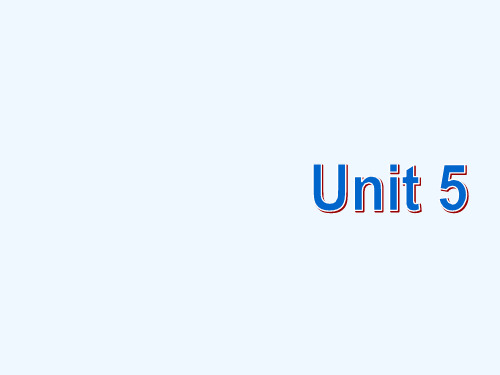
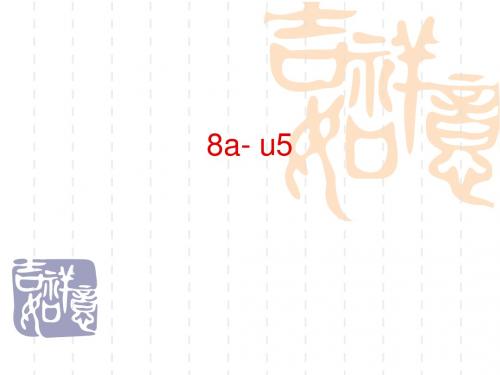
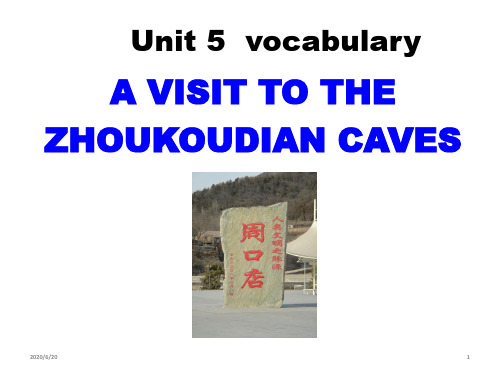
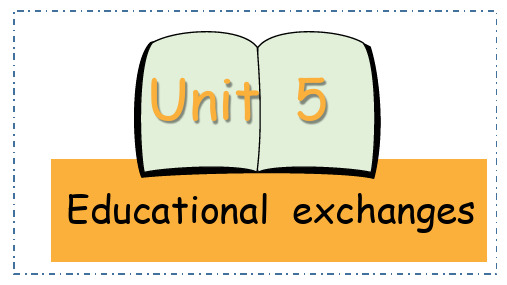
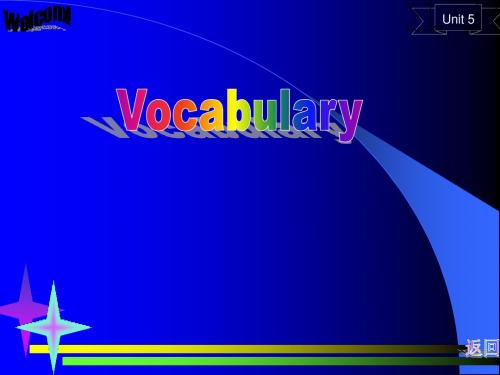
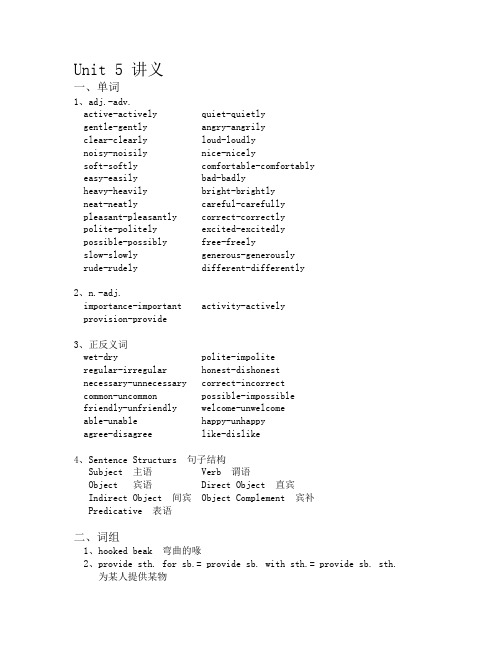
Unit 5 讲义一、单词1、adj.-adv.active-actively quiet-quietlygentle-gently angry-angrilyclear-clearly loud-loudlynoisy-noisily nice-nicelysoft-softly comfortable-comfortablyeasy-easily bad-badlyheavy-heavily bright-brightlyneat-neatly careful-carefullypleasant-pleasantly correct-correctlypolite-politely excited-excitedlypossible-possibly free-freelyslow-slowly generous-generouslyrude-rudely different-differently2、n.-adj.importance-important activity-activelyprovision-provide3、正反义词wet-dry polite-impoliteregular-irregular honest-dishonestnecessary-unnecessary correct-incorrectcommon-uncommon possible-impossiblefriendly-unfriendly welcome-unwelcomeable-unable happy-unhappyagree-disagree like-dislike4、Sentence Structurs 句子结构Subject 主语 Verb 谓语Object 宾语 Direct Object 直宾Indirect Object 间宾 Object Complement 宾补Predicative 表语二、词组1、hooked beak 弯曲的喙2、provide sth. for sb.= provide sb. with sth.= provide sb. sth.为某人提供某物3、nature(n.定语)reserve 自然保护区4、in north-east China = in the north-east of China 在中国的东北部5、different kinds of 不同种类的6、stay there for a short time 在那里停留很短的时间7、in the wetlands 在湿地8、an important living area 一个重要的生活区域9、make more space for = make more room for 为...腾出空间10、比较级 + and + 比较级越来越...more and more 越来越多less and less 越来越少(不可数n.)fewer and fewer 越来越少(可数n.)11、the Chinese government 中国政府12、secondary school students 中学生13、help them understand 帮助他们理解14、many other endangered birds 许多其他的濒危动物15、outside our school 在我们学校外面16、the home of = the home for ...的家园17、including前要加逗号18、prevent sb. (from) doing sth. = stop doing sth. = keep sb.from doing sth. 阻止某人做某事19、at Beijing Wildlife Park 在北京野生动物园20、Isn't that boring? No,not at all.难道它不无聊吗?不,它不无聊。
八年级英语寒假班(牛津版)教师日期学生课程编号05 课型复习/预习+专题课题8A U5复习+8B U5单词预习+宾语从句+阅读综合训练教学目标1.掌握宾语从句的用法:能运用所学知识点对宾语从句进行判断并完成相应的题目;2.宾语从句巩固复习和专项训练;3.阅读综合训练,根据文章的结构来分类训练。
4. 复习8A U5&预习8B U5词汇教学重点1.宾语从句的考查重点和常考考点;2.引导学生对文章体裁归类,总结做题方法和技巧。
教学安排版块时长1宾语从句总结回顾2师生总结3阅读分析总结4复习8A U5单词5预习8B U5单词6作业布置1.8A U5复习I. Complete the sentences with the given words in their proper forms. (用所给单词的适当形式完成下列句子)1. Look, many horses ______ (eat) grass on the side of the hill.2. It is not so ______ (heat) today as it was yesterday.3. He has ______ (free) to make a choice.4. Jane has a ______ (sweeten) voice and she sang ______ (great) at the English Evening.5. Is it ______ (true)? Tell me ______ (true) about the ______ (true).II. Rewrite the following sentences as required. 按要求改写句子。
1.Smoking is harmful to our health.(保持句意基本不变)Smoking is __________ __________ our health.2.He didn’t play football. He played with his sister.(合并为一句)He played with his sister __________ __________playing football.3.It took me more than five days to work out all the problems.(保持句意基本不变)I __________ more than five days __________out all the problems.4.Jane is 12 years old. Lucy is 12 years, too.(合并为一句)Jane is the__________ __________as Lucy.5.Jenny could hardly sing any songs.(改为反意疑问句)Jenny could hardly sing any songs, __________ __________?6.I looked after my pet dog well.(保持句意基本不变)I __________ __________ __________ __________ my pet dog.7. The weather in Thailand is very hot. (对划线部分提问)__________ the weather__________ in Thailand?2.8B U5单词预习8B Unit 5 Vocabulary(牛津)序号英文音标词性中文1 [sait] n. 视力,视觉2 [səʊl] n. 灵魂3 ['bæləns] n. 平衡能力4 [laɪn] n. 线条5 属于6 ['drɑːmə]n. 戏剧性事件7 一…就8 [rɪ'sepʃn] n. 接待处9 [ɪk'skleɪm ] v. 惊叫,呼喊10 [bɑːk]v. (狗)吠叫11 立即;马上12 [gest] n. 房客;旅客13 [liːd]v. 带路,引领14 ['pɜːsənəlɪ] adv. 本人,亲自15 ['sensɪbl] adj. 明智的,理智的16 [dɪ'skraɪb] v. 描述17 [ə'lɑːm]n. 警报器18 火警警报器19 (警报器等)突然发出巨响20 ['sɜːfɪs] n. 表面21 [ded] adj. 不运作的22 [kɒf] v. 咳嗽23 [siːm]v. 好像,似乎24 [weɪv] v. 挥手,招手,挥臂25 救了某人的性命26 [lend] v. 借给,借出27 [ɪ'vent] n. 重要事情;大事28 小心,留神29 [maɪnd] v. 小心,注意30 小心,当心31 留神,注意32 ['leɪbl] n. 标签33 [ˈhɑ:bə(r)]n. 港口,海湾PracticeComplete the sentences with the given words in their proper forms. (用所给单词的适当形式填空)1.My little sister is always the ___________ in my family. (scream)2.I was __________ lost in the beautiful mountain region. (complete)3.She’s such a ____________ girl that she always smiles. (cheer)4.He’s a lazy boy. His room is always ____________. (mess)5.She’s ___________ the door again. She never closes it quietly. (slam)6.Henry is the _____________ boy in my class, he never does his homework. (lazy)7.____________ children are always favoured by adults. (live)8.Lily always takes an _____________ part in school activities. (act)9.Poets, artists and inventors need _____________. (imagine)10.I’m _____________ sorry for being so late. (terrible)3.宾语从句人称转换★宾语从句的语序和连接词的用法【经典剖析】1.宾语从句的语序宾语从句必须用陈述句语序:主语十谓语+宾语从句(从句由“连接词+陈述句”构成2.引导宾语从句的连接词连词:that,whether/if疑问代词:who,whose,what,which,whom疑问副词:when,where,how,why1) that引导宾语从句只起连接作用,其本身没有意义,在口语中常可省略:主语+谓语+宾语从句("( that,+陈述句")I think(that)you should be more careful.我觉得你应多加小心。
8A u n i t5--W i l d-a n i m a l s-整个教案2(总19页)--本页仅作为文档封面,使用时请直接删除即可----内页可以根据需求调整合适字体及大小--8A Unit 5 Wild animals 第1课时Comic strip & Welcome to the unit 教案Teaching Aims and Demands●To talk about possible situations and possible results●To enlarge the vocabulary about wild animals●To use factual information to support their opinions on wild animals●To learn to take the responsibility to protect wild animalsKnowledge objects: to master the following phrasesWords and expressions:Wild free dish pitydie giant panda zebraSentences: They may become dishes on the table any time .Could you please not eat them?I may die without them.Important & difficult points:star signs and symbols。
,,。
2. Grasp the positive and negative of adjs and the adjs describing a person Teaching Aids: Tape recorder Multi-Media.Teaching procedures:Step 1 Warming-upEnjoy a video, try to say the names of wild animals as many as possible. Teach: wild freeStep 2 Presentation1. Encourage the students to talk about the competition the animals will have.2. Teach the names of the wild animals, and let students remember them quickly.3. Play a guessing-game.4. Listen to the conversation between Millie and her classmates, then fill in the table.5. Let students read the conversation and then make up similar dialogues in groups like this.Step 3 Comic strip1. Let students listen and answer the question.Would Eddie like to live in the wild Why/why not2. Let students read the dialogue.Explain: dish no way have/take pity on die in fact2. Let students try to act the dialogue out. They can add something they need. Step 4 Discussion1.T: We should help wild animals. They are our best friends. How can weprotect them Let the Ss discuss the ways of protecting wild animals in groups.2.Enjoy a video by Jacky Chan, and know that when the buying stops, thekilling can too. Protecting animals is protecting ourselves.Step 6 Homework1. Try to say something about wild animals to your friends.2. Finish the exercises and get ready for the next period.课堂测评一、根据描述和首字母填动物名称:1. There are many w__________________ animals in the forest.;2. What do _______________(松鼠)like to eat?3. The _______________(海豚) show attract many visitors.4. Giant pandas and________________(熊)look alike.5. T______________ have yellow fur with black strips.二.将下列词组译成英语.1 同情________________2 实际上 ____________3 随时________________4 动物世界的国王 ___________5 野生动物 _____________6 住在野外 _______________三.选择题1— Would you like to go to the hospital to help the sick kids this Sunday.—______, I’ll be free then.(2012浙江温州)A. Sorry, I can’tB. Not at allC. Thank youD. Sure, I'd love to2 ---Is the film interesting I--- I thought it would be . But _______ , it’s very boring.A in allB in factC in additionD in future3 Which do you like ______ , bears or tigersA wellB bestC betterD good4 ---My moth er says that we won’t go on a trip to Hong Kong Disneyland . I just can’t understand .-----___________.A Never mindB Enjoy yourselvesC What a pityD Don’t worry about it.教学反思:8A Unit 5 Wild animals 第2课时教案Giant pandas Reading1Teaching Aims and Demandsget the general idea of passage according to the time ordermaster the story of Xi Wangskim the passage to get the general idea.4 To sequence information to follow the gist of a storyKnowledge objects1. To m ake the students know more about Giant pandas2. Let the students know some words about the growth of Giant pandas.3. To make the students know the knowledge about describing the story of Xi WangAbility Objects1. To improve students’ ability of getting information through reading.2. To develop students’ ability of expressing their own opinions in English Teaching Difficulties1. The understanding of some long sentences.2. The students use their own words to express their own ideas.3. The students read the new words.Teaching Aids: Tape recorder Multi-Media.Teaching ProceduresPart One Pre-readingStep 1 Guessing gameToday we are going to learn Unit 5 Wild animals Reading.We learned many wild animals, such as tigers, bears, kangaroos…First, let’s play a game called ‘guessing game’I’ll describe one kind of animals, please tell me what it is at once.It is a sea animal and looks like a large fish. It is very clever and often plays some games for us in the zoo.Yes, it’s a dolphin.It’s a heavy wild animal with thick fur and sharp paws. It can walk upright. Yes, it’s a bear.It’s the king of the animal world. It has yellow fur and black stripes on its body.Yes, it’s a tiger.It jumps with its baby in its pocket. You can see it in Australia.Yes, it’s a kangaroo.It lives in China. It is black and white. Its favorite food is bamboo shoots and leaves.Yes, it’s a giant panda.Step 2 PracticeNow, let’s have a discussion.Which animal do you like best WhyWhich animal do you like least WhyPart Two While-readingStep 1 PresentationI like giant pandas best. Because I think they are beautiful black and white animals. They are very lovely, quiet and peaceful.Today I will show you a passage about a giant panda called ‘Xi Wang.Step 2 ReadingWe can divide the passage into three parts. try to remember the new words. Open your books, turn to page 59, finish Part B1. Let’s check the answers. together.。
8A译林版词汇表(版)注:加黄色底纹的是新教材新增加的词汇。
Unit 1(和旧版Unit 1话题一样)Welcome to the unitthirsty adj.口渴的(6)honest adj.诚实的,正直的(7)secret n.秘密(7)keep a secret保守秘密(7)joy n.欢乐,高兴;乐趣(7)care vi.& vt.关心,关注,在意(7)care about关心,关怀(7)yourself pron.你自己(7)teenager n.(13至19岁的)青少年(7)magazine n.杂志(7)good-looking adj.好看的,漂亮的(7)polite adj.礼貌的(7)tidy adj.爱整洁的,整洁的(7)make v.成为;适合(7)trust vt.信任(7)lie n.谎言joke n.玩笑(7)true adj.确实的;的确(7)旧教材删除的有:more, nothing, bowl, special, sad, believe, musicalReading*generous adj.慷慨的,大方的(8)*willing adj.乐意的,愿意的(8)any time adv.(=anytime)在任何时候voice n.噪音(8)singer n.歌手(8)almost adv.几乎,差不多(8)round adj.圆形的(8)sense n.感觉;观念,意识(8)*humour n.<英>幽默=<美>humor(8)bored adj.无聊的(8)fit vi.可容纳,装进(8)knock vt.碰,撞;把……撞击成(8)onto prep.到…的上面(8)straight adj.笔直的(8)sweet adj.可爱的,惹人喜爱的(8)smile vi.微笑(8)*personality n.个性(8)choose vt. & vi. 选择;挑选(9)旧教材删除的有:slim, ready, eyesight, smart, off, adertisement, shoulder-lenghth, everyone, true, vote, Vocabulary部分:thin, square, handsome, cheerful, printer, betterGrammarworse adj.(bad的比较级)更差,更糟,更坏(11)worst adj.(bad的最高级)最差,最糟,最坏(11)height n.高,高度(12)weight n.重量(12)sec. abbr. (= second)秒(12)competition n.竞赛,比赛,竞争(12)test n.测试,考查(12)swimmer n.游泳者(12)旧教材删除的有:hiking, cycling, camping, skiing, diving, outdoor, activity,Integratedplan n.打算,计划(13)social adj.社会的(13)social worker n.社会福利工作者(13)humorous adj.幽默的(14)*ponytail n.马尾辫(14)shy adj.害羞的(14)旧教材删除的有:solve, editor, future, become, famous, sporty, agree, runner, reader, secondary, nervous, uncomfortable, miss, adviceTasksquare adj.方形的(16)smiling adj.微笑的,带着笑意的(16)handsome adj.英俊的(16)fat adj.胖的(16)hard-working adj.勤奋的,工作努力的(16)patient adj.耐心的(16)smile n.微笑(17)excellent adj.杰出的,极好的(17)旧教材删除的有:dark, general,appearance,neat, pleasant, wear, climbing, exciting, correctly Unit 2(和旧版Unit 2话题一样)Welcome to the unit*advertisement n.(=ad)广告(18)British adj.英国的(19)biscuit n.<英>饼干(19)*lorry n.<英>饼干(19)rubber n.<英>橡皮(19)American adj.美国的(19)eraser n.<美>橡皮(19)*soccer n.<美>英式足球(19)cookie n.<美>饼干(19)vacation n.<美>假期(19)fall n.<美>秋天( )store n.<美>商店( )truck n. <美>卡车( )yard n. <美>院子( )movie n. <美>电影( )can’t wait迫不及待( )旧教材删除的有:lift, post, elevator, math Reading*mixed adj.男女混合的;混合的(20)French n.法语(20)foreign adj.外国的(20)language n.语言(20)|during prep.在…期间(20)discuss vt.讨论,议论(20)in class在课堂上(20)*guy n.<口>家伙(20)*buddy n.<口>好朋友;搭档(20)offer vt.主动提出,自愿给予(20)end /end/ vi. & vt.结束(20)baseball n.棒球(20)win vt. & vi.赢得;赢,获胜(20)旧教材删除的有:subject, Home Economics, sew, myself,tasty, even, softball, practice, senior, hero, close, taste,article, admire V ocabulary部分:art, geography, language, PE, science, useful, unimportant, useless, unpopularGrammarleast adj.最少的;最小的(23)further; farther adv.(far的比较级) 较远(24)furthest ; farthest adv. (far的最高级)最远(24)wonderfully adv.很好地(24)旧教材删除的有:point, health, online, timetableIntegratedspend vt.花费(时间或金钱)(25)spend time on / doing sth 花时间做某事(25)*uniform n.制服(25)chess n.国际象棋(26)at most最多(26)ww w.Study skills(全部变化)daily adj.每日的,日常的(27)weekly adj.每周的(27)quick adj.快的(27)look through浏览,快速查看(27)real adj.真实的(27)keep (on) doing sth继续,重复做某事(27)at first 起初,首先(27)旧教材删除的有:length, summertime, able, tonight, monkeyTask*lunchtime n.午餐时间(28)physics n.物理(学)(28)*badminton n.羽毛球(28)*ideal adj.理想的(28)finish vi. & vt.完成;结束(28)旧教材删除的有:baseball, table tennis, tennis.chess, drama, hall, pop, paper clipUnit 3(和旧版Unit 3话题一样)Welcome to the unitcome on 来吧;赶快(30)ourselves pron.我们自己(30)enjoy oneself玩得愉快(30)Australia n.澳大利亚(31)wwW. 6coffee n.咖啡(31)top n.顶部,(物体的)上面(31)president n.总统,国家主席(31)wide adj. …宽的;宽广的(31)*steel n.钢(31)ton n.吨(31)fine adv.够好,蛮不错(31)旧教材删除的有:greeting, block, foreign, cityReadingjoin vt. & vi.加入,参加(32)myself pron.我自己(32)shine vi.照耀,发光(32)sky n.天,天空(32)clear adj.晴朗的(32)journey n.旅行,旅程(32)boring adj.乏味的(32)finally adv.最后(32)arrive vi.到达(32)arrive at/in到达(32)get off下车(32)interest n.令人感兴趣的事(或人);兴趣(32)place of interest n.景点(32)not believe one’s eyes不相信自己的眼睛,非常惊讶(32)main adj.主要的(32)*sights n.[复]名胜,风景(32)culture n.文化(32)Internet n.网络(32)page n.页,页面,页码(32)home page n.主页(32)yourselves pron.你们自己(32)themselves pron.他们自己(34)by oneself独立地,独自(34)旧教材删除的有:mom, beginning, coach, traffic, highway, model, metal, inside, whole, pyramid, real, song, parade, movement, stomachVocabulary部分:view, beautyGrammaritself pron.它自己(36)pull vt. & vi. 拉;拖;移开(36)rock n.岩石(36)luckily adv.幸好的,幸运的是(36)climber n.登山者,攀爬者(36)旧教材删除的有:sunset, possible, themselves, hide-and-seek, wonder, luckyIntegrated*final n.决赛(37)support n.支持(37)take place 进行,发生(37)cheer vi. & vt. 欢呼,喝彩(37)reach vt.到达(37)*half-time n.中场休息(37)get on上车(37)rest vi.休息,歇息(38)free adj.免费的(38)Study skillshelpless adj.无助的(39)useful adj.有用的,有益的(39)*useless adj.无用的(39)taste n.味道;品味(39)*cheerful adj.兴高采烈的(39)* colourful adj.多彩的(39)ticket vt.留着;不退还(39)旧教材删除的有: fare, itcket, supporter, half-time, presentation, medal, per, winner, receive, fact, opinionTasksquare n.广场(39)旧教材删除:pack, instead, badly, airport, shuttle bus Unit 4(新编的,全部变化)Welcome to the unitclear adj.清楚的,明白的;清晰的(42)instruction n.指示(42)had better (=’d better )最好(42)tool n.工具(42)no problem 没问题(42)*brush n.刷子;画笔(42)glue n.胶水(42)rope n.绳索43)scissors n.[复]剪刀43)tape n.磁带;胶带43)DIY n.自己动手做43)Exactly adv.确切地,精确地43)stand for 代表;象征(43)repair vt.修补(43)*decorate vt.装饰(43)Instead of而不是,代替(43)rose n.玫瑰(花)(43)Readingcrazy adj.着迷的,狂热的,发疯的(44)be crazy about 对……着迷(44)terrible adj.可怕的(44)once adv.曾经,一度(44)put in 安装(44)mistake n.错误,失误(44)make a mistake 犯错误(44)*power cut n.供电中断;停电(44)*pipe n.管子,水管(44)fill vt.使充满(44)fill ... with ...用...填充 (44)not only … but (also)不仅…而且…;…和…都(44)*ceiling n.天花板(44)*shelf n.(pl. shelves) (橱柜或书架等的)架子,搁板(44)|*whoops excl.哎呀(44)advise vt. & vi.建议,忠告,劝告(44)course n.课程;过程(44)already adv.已经(44)instead adv.反而,却(44)attend vt. & vi.经常去;出席(44)Grammarcut vt.剪下,切下,割下(47)sentence n.句子(47)Integratedgrape n.葡萄(49)strawberry n.草莓(49)spoon n.匙,调羹(49)salad n.沙拉(49)*cream n.奶油,乳脂(49)mix vt. & vi.混合(49)add vt. & vi.增加,补充(49)tip n.提示,指点(50)eple 例如(50)leave vt.使处于某种状态(50)*sauce n.调味汁,酱(50)*ham n.火腿(50)correct adj.正确的(50)Study skillscertain adj.确定的(51)active adj.积极的,活跃的(51)possible adj.可能的(51)fix vt.安装,固定(51)tidy vi. & vt. 收拾,整理(51)tidy up 收拾妥,整理好(51)Tasksecret adj.秘密的(52)keep it secret 保密(52)spell vt. & vi.拼写(52)w W w.balloon n.气球(52)stick vt.& vi.粘住,钉住(52)cover n.封面;盖子,罩(52)complete vt.完成(52)paint n.颜料(52)Unit 5(和旧版Unit 4话题一样)Welcome to the unitwild adj.野生的n.自然环境,野生状态(56)free adj.自由的,不受束缚的(56)dish n.一道菜;盘,碟(56)no way <口>不可能(56)pity n.同情(56)have/ take pity on同情,怜悯(56)die vi.死(56)in fact实际上,事实上(56)*dolphin n.海豚(57)giant panda n.大熊猫(57)*squirrel n.松鼠(57)zebra n.斑马(57)旧教材删除的有:delicious, bearReadingmean vt.意思是,意味着(58)be born出生,出世(58)grow into长成(58)beginning n. 开始,起初(58)at the beginning一开始(58)sadly adv.令人遗憾地,不幸地;伤心地(58)*survive vi.活下来;幸存(58)face vt.面临;面对(58)serious adj.严重的(58)on one’s own独自,单独;独立地(58)cause vt.引起,使发生(58)while conj.当…的时候,和…同时(58)absent adj.不在的,缺席的(58)lose vt.失去,被……夺去;输掉(58)living n.生存,生计(58)cut down砍倒;削减,缩小(58)result n..结果(58)as a result因此(58)danger n.危险(58)in danger处境危险(58)action n.行动;行为(58)take action 采取行动(58)right away立刻,马上(58)encourage vt.劝告;鼓励(58)move vi. & vt.搬迁,移动(58)*reserve n.(动植物)保护区(58)law n.法律,法规(58)none pron.没有一个(人或物)(58)at birt h出生时,诞生时(60)旧教材删除的有:outside, bamboo, bamboo shoot, leaf, hunter, kill, farmer, nowhere, following, protect, continue, writerVocabulary部分:fo mar(全部变化)*bat n.蝙蝠(62)*bee n.蜜蜂(62)the same … as与……同样(62)save vt. & vi.储存,节省(62)旧教材删除的有:snake, rainforest, noon, information, reporter, attack, male, male, performance, examIntegrated*stripe n.条纹(63)*quality n.特性;才能(63)while n.一会儿,一段时间(63)*hunter n.猎人(63)catch vt.捉住,捕获(63)*wolf n.(pl. wolves )狼(63)thick adj.厚的;密的;浓的(63)kill vi.& vt.杀死(63)human n.人(63)*yours sincerely (正式信件署名的套话)你的真诚的(64)sorry adj.难过的,遗憾的(64)sell vt. & vi.卖,出售(64)pity n.遗憾,可惜(64)shame n.憾事;羞愧(64)act vi.& vt.行动;表演(64)Study skills(全部变化)illness n.疾病(65)accept vt. & vi.接受,收受(65)旧教材删除的有:until, medicine, hearing, smell, snail, loss, chairperson, group, destory, farmland, tusk, trainTaskreport n.报告(66)tail n.尾巴(66)*insect n.昆虫(66)slowly adv.缓慢地(66)*daytime n.白天(66)*otherwise adv.要不然,否则(67)旧教材删除的有:peaceful, female, mice, upright Unit 6(和旧版Unit 5话题一样)Welcome to the unit*birdwatching n. 观鸟(68)market n.市场(68)yeah e my adj.<口>美味的,可口的(68)*crane n.鹤(69)*sparrow n.麻雀(69)wwW.*feather n.羽毛(69)*swan n.天鹅(69)*eagle n.鹰(69)*broad adj.宽的,宽大的(69)wing n.翅膀(69)*type n.种类(69)*rare adj.罕见的,稀有的(69)旧教材删除的有:birdwatcher, roast, beak, seagull, long-winged, web-footed, swallow, long-pointed, forked, northern, golden eagle, brownish, hookedReadingnature n.大自然,自然界(70)*wetland n.(尤指为野生动物保存的)湿地(70)provide vt.提供(70)cover n.庇护所(70)*wildlife n.野生动物(70)perfect adj.极好的,完美的(70)round adv.周围,绕一整圈;转过来(70)all year round一年到头(70)while conj.然而(70)stay n.停留,逗留(70)easily adv.容易地,不费力地cent n.分;分币*per cent n.<英>百分之 (70)=<美>percentin order to以便,为的是(70)space n.空间(70)lead vi. & vt. 领导,带领(70)lead to导致(70)less and less越来越少(70)*moreover adv.此外(70)fisherman n. (pl. fishermen)渔民,钓鱼的人(70)fish vi.捕鱼(70)government n.政府(70)*prevent vt.防止,预防(70)record vt.记录(70)tourist n.旅行者,观光者(70)count vt.& vi.计算(或清点)总数;数数(70)describe vt.描述(70)understand vt.& vi.理解,明白(70)*importance n.重要性(70)旧教材删除的有:shelter, comfortably, red-crowned, farm, eddangered, actively, wet.Vocabulary部分:manners, impolite, regular, irregular, dishonest, unnecessary, correct, common, impossilbe, unfriendly, unwelcome, unable, incorrect, unable, incorrect, uncommon, litterGrammar(全部变化)|write down 写下,记下(73)旧教材删除的有:dove, return, quietly, gentle, gently, angry, angrily, clear, loud, noisy, nicely, softly, zookeeper, greet, frighten, dropIntegratedsouth-east n, adj. &adv.东南方(75)cover vt.覆盖;包括(75)*red- crowned crane n.丹顶鹤(75)*binocular s n.[复]望远镜(76)clearly adv.清晰地(76)Study skillsspeaker n.说话人;演讲者(77)tour n.旅行(77)旧教材删除的有:hectare, worm, including, prevent, snowstorm, flood, rest, centimetre, kilometre, degree, equal, dollar, therefore, per centTask*application n.申请(78)form n.表格(78)address n.地址(78)chairperson n.主席(79)introduce vt.介绍(79)natural adj.自然的,天然的(79)society n.协会;社会(79)旧教材删除的有:birth, hobby, simplyUnit 7(新编的)Welcome to the unit*foggy adj.有雾的,多雾的(81)rainy adj.有雨的(81)snowy adj.有雪的(81)旧教材删除的有:Reading*butterfly n.蝴蝶(82)shower n.阵雨;阵雪(82)*memory n.记忆,回忆(82)*stream n.小河,溪流(82)*shade n.阴凉处,树荫处(82)*pile n.堆(82)Upon prep.(=on)在…之上(82)*harvest vt. & vi.收割,收获(82)*crop n.庄稼,收成(82)as conj.当…时;随着(82)temperature n.温度(82)drop vi. & vt. 下降,落下(82)rise vi.上升;升起(84)Grammarcloud n.云(86)kick vt.踢(86)fever n.发烧(86)cough vi.咳嗽(86)awful adj.糟糕的,很坏的(86)Integratedwind n.风(87)*mainly adv.主要地;大部分(87)around adv.大约(87)*snowstorm n.暴风雪(87)*sunshine n.阳光(87)rest /rest/ n.其余的部分(人)(87)degree n.度数(87)bit n.一点,少量(88)a bit 有一点(88)blow vi. & vt.吹;刮(88)loud adv.大声地(88)ring vt. & vi.给……打电话;响起铃声(88)Study skills*fog n.雾(89)sleepy adj.困倦的;瞌睡的(89)*shiny adj.光亮的;反光的(89)sudden adj.突然的(89)*snowball n.雪球(89)fight n.打仗(架)(89)Taskdeep adj.深的(90)*frozen adj.结冰的(90)land n.陆地(90)exciting adj.激动人心的(90)throw vt.扔,投,掷(90)*snowman n. (pl. snowmen ) 雪人(90)*scream vi. & vt.尖叫,惊呼(90)ice n.冰(90)everywhere a dv.到处(90)Unit 8(和旧版Unit 6话题一样)Welcome to the unit*disaster n.灾难;不幸,祸患(92)*mop vt.用拖把擦干净(92)up adv.完全地(92)earthquake n.地震(93)thousands of 成千上万的(93)*accident n.事故,意外的事(93)coach n.长途汽车(93)*crash vi. & vt. 猛撞;碰撞(93)flood n.洪水,水灾(93)wash away 冲走(93)village n.村庄,乡村(93)lightning n.闪电(93)storm n.风暴,暴(风)雨(93)thunder n.雷,雷声(93)catch fire 着火(93)旧教材删除的有:natural, rainstorm, typhoon Reading*slight adj.轻微的(94)shake n.摇动,震动(94)loud adj.响亮的;大声的;喧闹的(94)*bomb n.炸弹(94)shake vi. & vt.摇动,震动(94)fear n.害怕,恐惧(94)direction n.方向(94)in all directions 四面八方(94)*brick n.砖,砖块(94)come down崩塌,坍塌(94)silent adj.寂静的(94)not … at all 一点也不(94)nervous adj.紧张不安的(94)heart n.心脏(94)beat vi. & vt.(使)规律作响,作节奏运动(94)*trapped adj.困住的(94)mind n.头脑(94)*calm vi. & vt. (使)平静,(使)镇定(94)*calm down冷静(94)since conj.由于,既然(94)still adv.仍然(94)alive adj.活着的(94)dark n.黑暗(94)find one’s way out找到出路(94)shout n.呼喊,喊叫声(94)at last最后,终于(94)*daylight n.日光(94)wwW.safe adj. 安全的(94)asleep adj.睡着的(96)after conj.在…以后(96)旧教材删除的有:body, scream, bomb, wildly, glass, calm, calm down, be trapped, moment, mind, somebody, hurry, everyoneVocabulary部分:cloud, wind, windy, fog, foggy, frost, frosty, weather, temperature, lowGrammarbreak vi.损坏;打破(97)break down (车辆或机器)出故障,坏掉(97)because of因为,由于(97)旧教材删除的有:project, discuss, guidebook, teribble, snowball, snowman, hitIntegrated(全部变化)as ... as possible尽可能 (99)*towel n.毛巾,浴巾(99)rule n.规则(99)railway n.铁路(99)pancake n.烙饼,薄饼(100)burn n.烧伤,烫伤,灼伤(100)Study skills(全部变化)daughter n.女儿(101)son n.儿子(101)granddaughter n.(外)孙女)(101)grandson n.(外)孙子(101)board n.木板(101)weekday n.工作日(星期一至星期五的任何一天)(101)headache n.头痛(101)toothache n.牙痛(101)countryside n.乡下,农村(101)housework n.家务活(101)旧教材删除的有:condition, cover, caller, victim. Arrival, mobile phone, serious, cause, lady, fireman, lastTasknearly adv.几乎,将近(102)clear vt.清除,清理(102)旧教材删除的有:remove, sandstorm, signal, warning, roll, situation, soldier不用注册,!。
牛津版八年级英语Unit 5 International charitiesVocabulary [ty]Part 1 Teaching designVOCABULAR Y pocket, further, education, affect, mostly, tough, case, cure, medical, treatment, operation, patient, afford, skill, train, operate, indeed, proud, medicine, treat, improve, rich, agreement, invention, excite, punish, ugly, war, research(四会);interviewer, blindness, especially, educate(三会);volunteer, voluntary, process(二会)EXPRESSION S pocket money, be used to, used to, health care, be kind to, international charities, medical treatment, operate on sb, perform an operation, be grateful to do, do some voluntary work, carry onSTRUCTURE S I’m not used to going out before lunch.You used to be very kind to me.People must be really grateful to you!I’m proud that I can help so many people.Do you know where it is?Don’t tell him I’m in the shower.Amy said some doctors work for 72 hours without sleep.You can help by making a donation or doing some voluntary work.I used to spend all my pocket money on clothes and snacks.What do you think about UNICEF?Many of our patients are so poor that they can’t afford to travel to hospital.Dr Ma has done such an important job that people must be really grateful to him.Period 4 V ocabulary(Suffixes ‘-ment’, ‘-ness’ and’-ion’)Teaching goals●To develop an understanding of suffixes●To use proper verbs and adjectives in contextTeaching proceduresStep 1 Having a revisionTo begin with, answer my questions about Reading:What kind of people go to ORBIS for help? (Blind and poor people.)Can most cases of blindness be cured or prevented? (Yes.)What do ORBIS doctors do? (They treat many patients.)Do the patients need to pay for the treatment? (No.)How do ORBIS doctors treat them? (They operate on them.=They perform operations on them.) What is the relationship between “blind”and “blindness, “treat”and “treatment”, “operate”and “operation”?W e can form nouns by adding suffixes ‘-ment’, ‘-ness’, or ‘-ion’ to some verbs and adjectives. Sometimes we need to change the ending of the verb or adjective before we add the suffix.happy-y+i+ness=happinesscelebrate-e+ion=celebrationinvite-e+ation=invitationWhat is a suffix?A suffix is a word ending. It is a group of letters you can add to the end of a rootword*e.g. walking, helpful*A root word stands on its own as a word, but you can make new words from it byadding beginnings (prefixes) and endings (suffixes).For example, 'comfort' is a root word. By adding the prefix 'dis' and the suffix 'able'you can make new words such as 'discomfort' and 'comfortable'.Adding suffixes to words can change or add to their meaning, but most importantlythey show how a word will be used in a sentence and what part of speech (e.g. noun,verb, adjective) the word belongs to.e.g. If you want to use the root word 'talk' in the following sentence:I was (talk) to Samina.You need to add the suffix 'ing' so that the word 'talk' makes better sensegrammatically:"I was talking to Samina".There are various suffixes we use. Probably the most common are 'ed' and 'ing'.Here are some other suffixes and examples.Step 2 Finishing off Part AGo to page 82 to help Daniel to change verbs and adjectives into nouns, checking the answers with your partner. Think of more examples if you can.Step 3 Finishing off Part BFill in the blanks in Part B on page 82. Then read the e-mail aloud.Step 4 Doing additional exercises用括号中所给词的适当形式填空1.The children in poor countries have to _____ empty bottles to earn money. Last term our schoolmade a _____ for children in poor areas. (collect)2.He could not pay his rent, so he had to _____ out. There was too much _____ of cars on the cityroads. (move)3.Old people live a _____ life in our country. It’s a great _____ for us to welcome you here.(happy)4.The teacher always _____ her students as her children. The new _____ for blindness makessome patients see again. (treat)5.Traveling by coach makes us feel _____ all the way. There isn’t much _____ here this year.(sick)(Keys: collect, collection; move, movement; happy, happiness; teats, treatment; sick, sickness ) Step 5 Homeworka. Read and learn these suffixes heart.Suffix Example Suffix Exampleed walk + ed = walked ness happy + ness = happinessing say + ing = saying al accident + al = accidentaler tall + er = taller ary imagine + ary = imaginarytion educate + tion = education able accept + able = acceptablesion divide + sion = division ly love + ly = lovelySuffix Example Suffix Examplecian music + cian = musician ment excite + ment = excitementfully hope + fully = hopefully ful help + ful + helpfulest large + est = largest y ease + y = easyb. Finish off the exercises in the Evaluation Handbook.Period 5 Grammar I(‘Used to’ and ‘Be used to’)Teaching goals●To use ‘used to’ to talk about a past habit or state●To use ‘be used to’ to talk about what we have done regularlyTeaching proceduresStep 1 Having a revisionDo you still remember Dr. Ma? What is he? (A doctor.)Where did he work in the past? (In the hospital.)Where does he work now? (On the ORBIS plane.)So we can say Dr. Ma used to work in the hospital. We use ‘used to’ to talk about a past habit or state. We can use an infinitive after ‘used to’.Step 2 PracticingS ay something about Dr. Ma’s life when he worked in a hospital using ‘used to’.Step 3 Doing an extension activityI am going to tell you about my own life.I used to live in …I used to go to … Secondary school.I used to play badminton twice a week.…Show a photo of your family. In pairs, tell each other what your lives were like in the past. Each student should make up at least 3 sentences with ‘used to’.Step 4 PresentingNow Dr. Ma works on the ORBIS plane. He lives a life which is different from the one in the past. But he is used to his new life. He is used to working on the ORBIS plane.We use ‘be used to’ to talk about something we have done regularly for a long time so that it is not new any more. We put it before a noun (phrase) or an “-ing” form of a verb.Step 5 Finishing off the exercisesGo to page 83 to finish exercises in Part A, B and C in pairs.Step 6 Doing an extension activityHow have your lives changed since you started secondary school?What new experiences and routines were you not familiar with at first? Like the different method of traveling to school, larger school size, different uniforms, more subjects offered. Work together to formulate sentences to express the idea of becoming accustomed to something.I am used to taking the bus to school.I am used to the larger classes at secondary school.I am used to wearing the school uniform.I am used to studying more than 10 subjects a week.Step 7 Coming to a summaryCompare ‘used to’ and ‘be used to’, and then work out the rule on page 84.used to与be used to的运用区别●used to + do:“过去常常”表示过去习惯性的动作或状态,但如今已不存在。